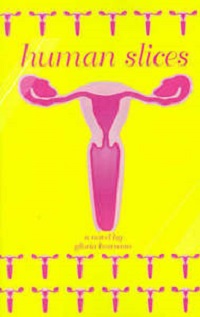I recently had the pleasure of asking author Gloria Bowman about her novel, Human Slices, which has a main female character who is childfree. We also got into the childfree in novels and films. Check it out:
Q&A with Gloria Bowman
What inspired you to write Human Slices?
When I wrote the book, in my much younger days, I was trying to find my voice — and to be a voice for women who were of childbearing years and who had decided on childlessness. I also wanted to be a voice for those who may not have gone through a decision-making process to be childfree but knew in their hearts that motherhood wasn’t something they aspired to.

Gloria Bowman
Can you tell us a bit about the story line?
Human Slices is first of all a romance, a story about coupling and uncoupling and recoupling. Unlike a typical romance, the story is populated with characters who are a bit on the quirky side and who are living lifestyles that also register a bit off-kilter. Salm, the main female character (short for “Little Salmon,” her father’s childhood nickname for her), has always known she doesn’t want children and that self-knowledge has negatively impacted previous relationships in her life. She meets and falls for a man named Luke who understands and accepts her position but he has second thoughts when his best friend becomes a father.
What has been your experience of reading about characters who are childfree – with no children by choice?
There are stacks of books and stories with female characters without children—from contemporary writers like Elizabeth Gilbert as well as the likes of Colette, Marguerite Duras, Edgar Allan Poe, Anais Nin, and Jacqueline Susann. In fact, one of the best quotes about women and children is from D.H. Lawrence: “That she bear children is not a woman’s significance. But that she bear herself, that is her supreme and risky fate.”
I would venture to say, however, that a great number of the characters are more characterized as being childless by circumstance, not necessarily by choice and how that choice came to be. As far as contemporary novels, I am drawn to those that feature childfree or implied-childfree lives (at least until after the book ends). If I pick up a book that has a lot to do with motherhood, it’s a hard nut to crack. And if a character with no children spends a lot of time longing to change that state of being, I can lose interest quickly.
How do you see women with no children portrayed in books and films?
There are a lot of childfree women in books and films — it’s just that the childfree character is usually bitter or unfulfilled or evil or zany (trying to take on motherhood by accident) or cold or other fill-in-the-blank stereotypes. All too often women who don’t reproduce are still marginalized and “suspect.”
I just watched the film Atonement, and there is this scene of a woman with dementia pushing an empty baby carriage–the lead character’s vision of herself in old age. Really? It was as if the filmmaker was saying everything would have been fine if she had just had a baby.
And of course a prime example is with the ever-popular Sex in the City show with the character, Carrie, the heroine, who is childfree yet also characterized as irrational and flighty, driven by selfishness, consumerism, and having one love crisis after another. The other childfree character, Samantha, is the “whore,” of course, and she’s the one who gets breast cancer and it’s represented as a kind of punishment because we’re reminded that not having children can increase your risk of that disease. The two “good girls” have babies.
I enjoyed seeing this season of the Bravo TV reality show, Southern Charm. One of the main players is a young woman who doesn’t want to have children. She is pondering and questioning it, and her mother says something to her like, “It’s OK if you don’t have kids.” That seemed to me a revolutionary moment on television!
Do you think we will see more childfree characters in film and books?
It will evolve and the market will decide. Look at how older women are appearing in more and more books and films. People are paying attention to the elder demographic because it’s powerful. As the population changes and technology opens doors and tired gatekeepers fade away, the doors open wider and wider for the childfree to be represented and portrayed in a more meaningful way.
Thank you, Gloria! Learn more about Gloria and her book at gloriabowman.com.






My favorite TV shows over the years included many main characters who were childfree. How about Seinfeld, the 1990s hit show? All the main characters were CF and in many episodes kids were negatively portrayed as brats and often treated badly by the 4 main characters. Another show in that era, Star Trek: The Next Generation, had nearly all of its main characters CF and had very few episodes involving children.
You mentioned Sex and the City. I didn’t watch it until it went into syndication on E! in the last few years. But I can say that the show became much worse after Miranda (Cynthia Nixon) had her kid. Her plot lines were nearly unwatchable with her wailing brat and the impact it had on Miranda’s life.
Thank you for sharing your views on this topic. I myself am child free (calling it ‘kids free’) by choice. I did not even realize that there is this rather heated debate about this decision as it didn’t quite show in my circles. Other than family and friends finding it hard to believe that I could really choose to NOT have children. I am very happy about my choice to have a personal freedom in life and put my energy into other endeavors than bringing up children. Earlier this year I have started a women’s community group in Brisbane for ‘Kids Free Women’ and now we have over 100 members, which is exciting. Thank you for allowing me to comment on your post. All the best on your life journey.
Hi Hana, Thanks for writing! Love knowing you have started the Kids Free Women group and that it’s going well! ~Laura
Once we challenge our assumption that all females “should” or “will eventually” end up as mothers, there are many things to notice in the shows we watch. Even a show such as Everyone Loves Raymond. I often found myself asking, WHERE are the kids? There’s all this adult dialogue going on, and where are the little kids? The show makes it appear that adult dialogue is easy to accomplish with 3 kiddos underfoot. It’s not! And herein lies a big part of the problem—the illusion of what it’s going to look like. Reality-based shows, depicting lives without kids as perfectly wonderful, as well as lives with kids as…well…let’s just say, Hollywood often endorses romantic ideas versus reality.